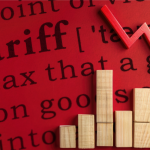
The magnificent seven stocks have captured a lot of investor attention and investment in 2023. Those seven tech firms have been responsible for a great portion of the overall market rebound this year. They also hold 7 of the top 9 spots for market capitalization, with Berkshire Hathaway (NYSE:BRK-A, NYSE:BRK-B) and Saudi Aramco being more valuable than a handful of members.
Saudi Aramco won’t become the eighth member because it isn’t traded in the U.S., so it effectively has no chance. I also don’t think Berkshire Hathaway will break into its ranks simply because it’s not exciting overall. I do believe the next firm to enter the group will have a massive market cap, but it isn’t necessarily destined to be an American firm.
Visa (V)

Visa (NYSE:V) has a reasonable chance of joining the magnificent seven as consumer spending reaches new heights.
It has become plainly evident that our economy is reliant upon debt. That’s true of our government, and it’s true of our people as consumers. U.S. GDP is proving surprisingly strong of late. There are a lot of reasons for that fact, but in my mind, debt consumption is the primary factor. On the public side, the government continues to run massive deficits that create an ever-growing national debt. And on the private side, consumers continue to use credit to prop up their spending habits.
Americans are addicted to credit cards and debt. As an investor, one of the best ways to capitalize on that truth is to simply invest in Visa stock. It is the largest credit card company by market cap. Thus, I believe it has a reasonable chance of joining the magnificent seven as an even more credit-dependent new economy emerges.
Eli Lilly (LLY)

Eli Lilly (NYSE:LLY) is another clear contender to join the ranks of the most valuable stocks. It’s all about Mounjaro.
Eli Lilly’s blockbuster diabetes medication is expected to receive FDA approval as a weight loss treatment perhaps by the end of this year. Demand for the drug is already very high, and FDA approval as a weight loss treatment would push demand even higher.
Eli Lilly is already experiencing difficulty fulfilling demand absent weight loss approval for the drug. The company is building a second manufacturing facility in North Carolina to supply the drug more effectively. Basically, it’s looking to succeed where its primary competition failed. The other weight loss drug giant, discussed below, didn’t anticipate the strength of demand it experienced when it released Wegovy and Ozempic.
That has opened a door of opportunity for Eli Lilly. Further, Mounjaro appears to be more effective than Ozempic for weight loss and diabetes, which will probably give it the edge overall.
Novo Nordisk (NVO)
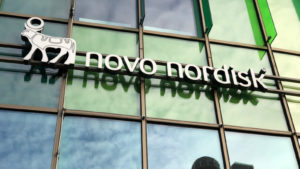
It’s now well established that Novo Nordisk (NYSE:NVO) bungled the launch of Wegovy. It was unable to sufficiently supply the drug following its launch. The company experienced multiple shortages during that period that cost it dearly. The company could have established a stronger market share during that period had it been better able to fulfill demand.
Nevertheless, Novo Nordisk remains a very, very strong competitor in the weight loss drug category. Wegovy’s sales increased by 734% during the most recent quarter. Ozempic, still unapproved for weight loss but sold off label for that purpose, saw sales increase by 56% during the quarter.
It’s clear that sales are very strong at Novo Nordisk. There’s also a chance that the company could beat Eli Lilly based on drug side effects. Mounjaro is associated with more severe side effects than Ozempic. Further, Ozempic confers proven cardiovascular benefits to type 2 diabetes patients, while Mounjaro does not. Either stock could garner a lot more attention in the near future and join the magnificent seven.
Taiwan Semiconductor (TSM)

Taiwan Semiconductor (NYSE:TSM) is the largest chip foundry globally and arguably the world’s most important company. TSM stock is already among the 15 most valuable globally, and investors know its position and importance.
For Taiwan Semiconductor to join the magnificent seven, it will require a catalyst. So, what could that catalyst be? I don’t think there will be a single defining catalyst at all. Rather, I think if Taiwan Semiconductor suddenly heats up, it will be because of a broad realization by the markets.
If the markets can recognize the secular trends en masse, TSMC shares will see much more demand. AI, IoT, EVs, smartphones, and digitization all require more chips. TSMC supplies those chips to all of the chip companies that dominate, including Nvidia (NASDAQ:NVDA), AMD (NASDAQ:AMD), Intel(NASDAQ:INTC), and every other chip ‘maker.’
Either that realization or a worsening of U.S.-China relations can serve to vault TSMC higher. Actually, it’ll be some combination of both, but pay attention to TSM stock.
Samsung (SSNLF)
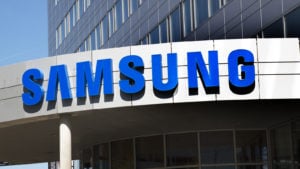
Samsung (OTCMKTS:SSNLF) is a dark horse contender to make the ‘elite eight’ of the stock market. However, it’s absolutely worth discussing and understanding. The firm is South Korea’s domestic champion and is very similar to Taiwan Semiconductor in many regards.
Currently, Samsung is the 23rd most valuable stock based on market capitalization. It does not trade on the major U.S. exchanges. Those who want to invest in it can find it on the OTC markets or on the KOSPI in their home country.
Anyway, Samsung is a massive firm led by its electronics segment. It is also a major chip foundry and produces chips for thousands of firms globally. Taiwan is the leading semiconductor producer led by TSMC. South Korea is second, led by Samsung.
Samsung is in Korea and contributes to its economy in a massively outsized manner. The conglomerate operates in every sector and is responsible for about 20% of South Korea’s GDP. While that has major downsides, it presents real opportunity when macroeconomic factors shift in the country’s favor. Samsung is uniquely positioned to capture strong returns when that occurs.
LVMH Moet Hennessy Louis Vuitton (LVMHF)
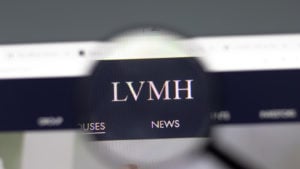
LVMH Moet Hennessy Louis Vuitton (OTCMKTS:LVMHF) is another stock that is highly valued by market cap, doesn’t trade on the major U.S. exchanges, but has strong potential.
So, why should investors believe that LVMH Moet Hennessy Louis Vuitton could find itself amongst the most popular U.S. traded stocks? The answer is that the economy is shifting, and that is creating more and more nouveau riche.
The richest 1 percent captured 54% of new global wealth over the decade between 2011-2021. That percentage accelerated to 63% between 2019 and 2021. So, when you hear people ranting about the rich getting richer, they do have valid points.
This relates to LVMH Moet Hennessy Louis Vuitton because the rich and the nouveau riche demand luxury goods. LVMHF stock is unlikely to get enough attention in the U.S. markets for the reasons I mentioned above, but regardless, it is thriving, and sales are booming at the company. It’s worth considering those factors alone.
The global appetite for luxury goods is growing, and as middle-income nations get richer, LVMH Moet Hennessy Louis Vuitton will continue to have strong opportunities to increase its value.
JPMorgan Chase (JPM)
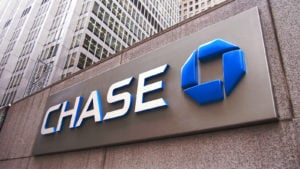
If any financial stock has a chance of breaking into the magnificent seven, it’s JPMorgan Chase (NYSE:JPM). America’s biggest bank is doing extraordinarily well in 2023 and continues to be a beacon of safety.
In fact, regional banking collapses earlier in the year served to strengthen JPMorgan Chase. The firm was quick to take the lead in ensuring the sanctity of the banking system. It gained a lot of recognition in doing so. That brought a lot of assets under its control as depositors sought the safety of large institutions.
It also allowed JPMorgan Chase to purchase valuable assets at low prices from those failing banks. I won’t get into details, but First Republic was a steal for JPMorgan Chase.
It’s probably also fair to assert that a banking stock is unlikely to join the tech-heavy magnificent seven. However, if the bank can digitize and modernize to appeal to tech audiences, there’s always a chance.
On the date of publication, Alex Sirois did not have (either directly or indirectly) any positions in the securities mentioned in this article. The opinions expressed in this article are those of the writer, subject to the InvestorPlace.com Publishing Guidelines.

